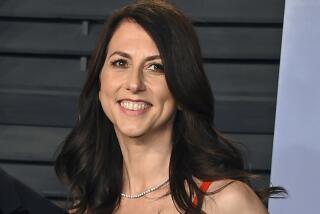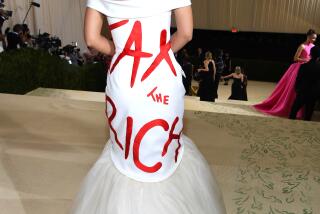Charities popping up for giving big or small
Bill Gates and Warren Buffett started it. Now a small but growing group of far less wealthy people are joining in by taking a public pledge to leave money to charity after they’re gone.
And it doesn’t require being one of America’s billionaires.
“Everyone can leave a bequest to charity of something,” said Elfrena Foord, a certified financial planner and co-founder of the California Plan Your Giving Project. “We want to change the idea that you have to be rich to leave money to charity.”
Charitable bequests certainly aren’t a new concept. Any number of museums, symphonies, nonprofits, churches and charities continually ask donors to leave something behind in their wills. And many people, especially at year-end tax time, routinely make financial donations to causes they care about.
But giving seems to be coming back in vogue. Nationally, total giving in 2011 by individuals was $218 billion — up nearly 4% from 2010, according to Giving USA, the research arm of the Center on Philanthropy at Indiana University. Donations by individuals are 73% of all charitable giving, it said.
And it comes in all sizes.
Billionaires such as investor Warren Buffett, along with Microsoft Corp. co-founder Bill Gates and his wife, Melinda, garnered big headlines in 2010 when they launched the Giving Pledge, which asks America’s billionaires to pledge at least 50% of their wealth to charity in their lifetime or after.
Nearly 100 individuals and families have taken the pledge, from 28-year-old Facebook Inc. co-founder Mark Zuckerberg to aging oil tycoon T. Boone Pickens. Just last month, 12 more signed on, including Netflix Inc. Chief Executive Reed Hastings and Intel Corp. co-founder George Moore.
A more modest slice of the philanthropy movement are “giving circles,” in which like-minded people pool their money and give to causes they deem important.
One of those, the One Percent Foundation, aimed at those in their 20s and 30s, was co-founded in 2007 by Daniel Kaufman. Over conversations while at UCLA School of Law, he and some friends realized they rarely gave to any significant causes.
“Most of us felt we couldn’t afford to give, didn’t know where to give or thought our donation wouldn’t have any impact,” Kaufman said.
He and his friends pooled their money and sent $500 to a hunger relief organization voted on by the group. The idea caught on among their West Los Angeles friends. After graduating and scattering across the country, the group formalized the foundation online.
As the name implies, participants donate 1% of their annual income. For graduate students living on loans, that might mean a few bucks a month.
It’s all done online. Every quarter, the One Percenters dole out two grants in a designated category: environment, education, health, international aid or poverty. Members nominate organizations they’d like to see funded and the entire membership votes. Everyone gets one vote, no matter how much they give.
“Part of it is getting people in the mind-set that they can do this. With rent, student loans, credit card payments, many [young adults] think ‘No way,’” said Kaufman, 33. “But if you change that to giving $20 a month, now it looks like a couple beers or going to the movies and buying popcorn. It totally changes how they think about [giving].”
Today, One Percent has about 500 members who have donated more than $200,000 in the last three years.
And Kaufman, who is an attorney, has launched Third Plateau, a philanthropic consulting firm.
Buck writes for the Sacramento Bee.






